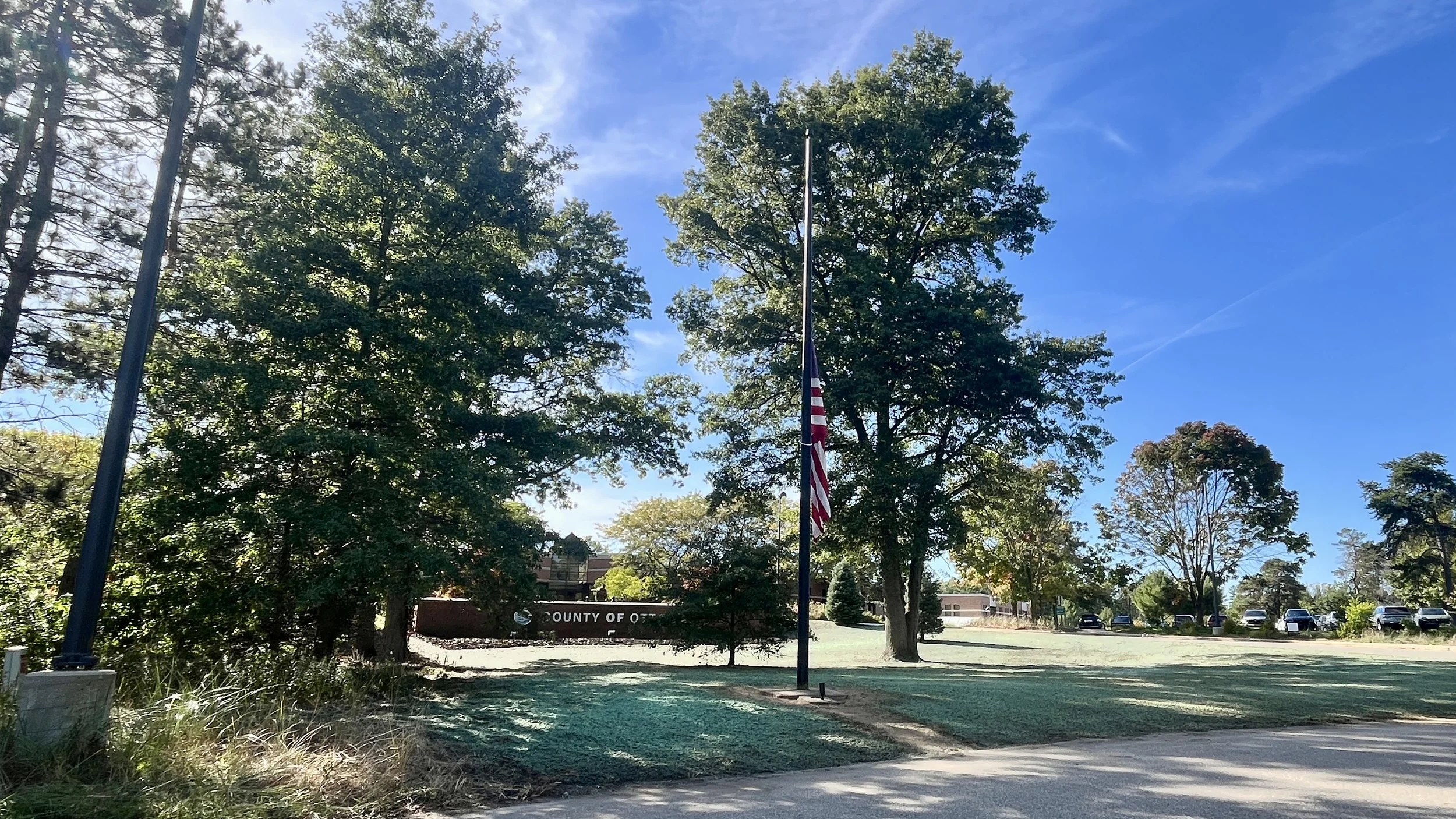On a potential CMH transition
Over the last few months, the Board and staff have been evaluating a potential conversion of our Community Mental Health Department into a CMH Authority. A great deal of thoughtful work has gone into this analysis, and I deeply appreciate the time and effort invested by staff and stakeholders.
Much of the discussion has centered on uncertainty—and rightly so. These are uncertain times, and it’s appropriate for the Board to take potential risks seriously.
But it’s important to ask the question holistically: does this action actually reduce uncertainty—or does it create more than it potentially resolves?
In my view, this change introduces more uncertainty than it works to solve.
Let’s start with a few important givens.
First, we have a department model that has worked well for decades, across different leadership teams and economic conditions.
Second, the Board of Commissioners currently provides direct public accountability, serving as a clear and transparent link between residents and the services they rely on.
Now consider what we would be taking on:
We would assume significant and undefined transition and startup costs for both the County and CMH itself.
We would move to a new governance structure that places greater distance between CMH and the citizens it serves.
We would lose direct operational accountability, including oversight of the CEO and key personnel policies. In practical terms, we would be removing the “emergency brake” the County currently holds if serious problems arise.
Finally, we would set CMH, its staff and the residents they serve, off on their own, separated from the collective resources and stability of Ottawa County.
For these reasons, I believe the department model remains the best option for Ottawa County: it preserves accountability, avoids unnecessary costs, and allows us to manage risk through practical measures rather than structural upheaval. We can bolster our position by improving financial oversight and processes, tightening cost controls and working together with the LRE to fortify Fund Balances - steps that reduce uncertainty without dismantling a system that works, and without exposing the County to new and unnecessary risks.
Indemnification of Commissioners
The board rules are out and while there are many items that have caught my attention, there is one item in particular that has caught my attention, section 3.2, Indemnification of Commissioners. You can view the current rule and proposed rule change below:
To my reading, this rule subjects any one commissioner's legal defense and potential indemnification to a vote of 8 commissioners. Defense is not guaranteed, and the judgment of whether a commissioner may have acted outside the scope of their authority is solely in the hands of 8 commissioners. This leaves an individual commissioner politically exposed to potentially tens or hundreds of thousands of dollars of financial penalties, solely because 8 commissioners made that determination. I believe this to be a drastic reduction of protection for commissioners.
In light of this, I will be offering the following amendment:
"The County shall provide a defense to Commissioners for acts undertaken in the course of their official duties. The County shall indemnify Commissioners for any judgment or settlement arising from such acts unless a court of competent jurisdiction determines that the Commissioner acted with willful misconduct, bad faith, or in knowing violation of law."
By saying "The County shall provide a defense..." without any qualifiers in that first sentence, the County pays for legal representation upfront, guaranteed. This prevents a Commissioner from being bankrupted by legal fees before the case even gets to a judge. It also moves the decision-making power from the Board room (where politics may rule) to the Courtroom (where evidence and law rule). The difference is simple: My version relies on a Judge to determine if a Commissioner acted in bad faith. The proposed Rule 3.2 relies on 8 Commissioners. If we believe in due process and the rule of law, we should leave legal judgments to the courts, not to a 2/3rds majority of this board.
Why the Change and what it Addresses:
✅ No political vulnerability - Board can't vote to cut off defense or indemnification indiscriminately
✅ Neutral legal standard - Only a court can determine bad faith/willful misconduct
✅ Defense is guaranteed - You shouldn’t need to pay for your own lawyer while lawsuit is pending
✅ Indemnification is presumed - County pays unless court finds egregious conduct
✅ Protects taxpayers - County isn't on the hook for willful misconduct or bad faith
✅ Minority commissioners protected - Can't be financially targeted by majority
✅ Settlement leverage still exists - Court might find willful misconduct/bad faith, creating uncertainty for both plaintiff and commissioner and pushes both sides to settle.
✅ County not liable for egregious or criminal behavior - Willful misconduct exception covers egregious behavior
✅ Recruiting protection - Candidates know they won't lose life savings over good-faith actions
Proposed Amendments to Our Board Rules
When we talk about "good government," we aren't usually talking about high-profile debates or campaign slogans. We are talking about the internal rules and procedures that determine how decisions are made.
Below are my current amendments to those Rules and why I believe they are important:
Proposed Amendment to Rule 2.3
Change the following paragraph:
~~MCL46.3 states: “The chairperson shall be elected each odd numbered year for a 2-year term, unless the county board of commissioners provides by resolution that the chairperson shall be elected annually for a 1-year term.” Thus, the Board establishes that the Chairperson may serve no more than two, 1-year terms during their current 4-year term or until a successor is duly elected and qualified as provided in these rules.~~
To:
MCL 46.3 states: 'The chairperson shall be elected each odd numbered year for a 2-year term, unless the county board of commissioners provides by resolution that the chairperson shall be elected annually for a 1-year term.' Thus, the Board establishes that the Chairperson may serve no more than two, 1-year terms during their current 4-year term, as provided by Board Resolution and State Law."
The Change: Aligns the definition of the term length to the Board Resolution and State Law.
The Goal: Structural Integrity. It maintains the 2-year cap on leadership while moving the technical details to the Resolution.
Proposed Amendment to Rule 4.2 – Organizational Meetings
Change the following paragraph from:
“The Board shall convene for its first meeting on the first business day after January 1 of each year. This meeting shall be known as the Organizational Meeting and the Board shall transact such business at said meeting, or at the adjournment date of such meeting, as shall be provided by these Rules or by law, including but not limited to the election of a Chairperson and a Vice-Chairperson. The Clerk of the Board shall preside over the Organizational Meeting until a Chairperson of the Board has been duly elected by a majority vote of the Commissioners.
To:
“The Board shall convene for its first meeting on the first business day after January 1 of each year. This meeting shall be known as the Organizational Meeting. The Clerk of the Board shall preside over the Organizational Meeting until a Chairperson of the Board has been duly elected by a majority vote of the Commissioners. At the Organizational Meeting, or at the adjournment of such meeting, the Board shall transact organizational business as required by law and the following:
Election of a Chairperson of the Board;
Election of a Vice-Chairperson of the Board;
Establishment of the schedule of regular Board meetings, including dates and times;
Appointment of Commissioners to Standing Committees,
Appointment of Commissioners to county and external boards, commissions, authorities, and similar bodies where such appointments are made by the Board or the Chairperson pursuant to these Rules, bylaws, ordinances, or state law; and
Adoption, amendment, or reaffirmation of the Rules of the Ottawa County Board of Commissioners.
Nothing in this Rule shall be construed to prohibit the Board from transacting other lawful business at the Organizational Meeting.”
The Change: Replaces vague language with a clear six-point list of core organizational business to be addressed at the start of each year. These items reflect longstanding practice at Organizational Meetings, even though they have not previously been explicitly codified in the Rules.
The Goal: Efficiency and clarity. Ensuring the Board completes its organizational work early in the year reduces uncertainty, improves transparency, and prevents essential governance items from being unnecessarily delayed.
Note: At the previous meeting, it was suggested that a new Chair shouldn't be expected to have assignments ready at the organizational meeting. However, first, chairs have successfully done this in prior years; and second, for the sake of transparency, I believe assignments should not only be prepared for presentation at the organizational meeting, but also shared in advance so commissioners can cast the most informed vote possible when it comes time to elect our new Chair.
Proposed Amendment to Rule 5.1 – Committee Assignments
Change last paragraph from:
“The Chairperson of the Board shall select the Chair of each Standing Committee and shall appoint Commissioners from the Board to serve on each Standing Committee. The Board Chairperson is an ex officio member of each standing committee.”
To:
“The Chairperson of the Board shall select the Chair of each Standing Committee and shall appoint Commissioners from the Board to serve on each Standing Committee, subject to approval of the Board of Commissioners by majority vote. The Board Chairperson is an ex officio member of each standing committee.”
The Change: Keeps the Chairperson’s ability to nominate committee members but makes those appointments subject to a majority vote of the Board.
The Goal: Collaboration. This brings committee assignments in line with how we already handle board and commission appointments - with Board approval. It's about consistency and accountability.
Note: I offered a very similar amendment two years because I believe that Committees that are not fully representative really should have Board input and approval. The motion at that time failed.
Proposed Amendment to Rule 6.3 - Add Discussion to BOC Agenda
Proposed language: Add: "11. Discussion Items"
The Change: Adds a permanent "Discussion Items" slot to the official Board Agenda.
The Goal: Representation. This allows any Commissioner to bring a topic to the floor for dialogue. It ensures every commissioner’s concerns can be heard.
Note: This matches our practice on agendas for Committees.
My Preliminary Position on CMH Transition.
Based on the information currently available, I do not support proceeding with the conversion of Ottawa County Community Mental Health from a county department to an independent authority at this time. This position is based on the following:
The risk driving this proposal is theoretical, not demonstrated.
Neither Ottawa County, nor any other Michigan County, have ever been required to use general fund dollars to cover CMH deficits. Likewise, no statute, appellate court decision (including Muskegon), or Attorney General opinion clearly establishes that counties are legally required to backstop CMH deficits with general fund dollars. The asserted financial risk is therefore speculative rather than evidenced.The promised ‘liability separation’ is likely illusory regardless.
The authority model meaningfully insulates the county only if the county is willing to allow the authority to fail. Given the essential nature of CMH services, political and moral reality makes non-intervention implausible. Statutory mandastes likewise prevent us from allowing that to occur. If the county intervenes in a crisis, —as it almost certainly would—the practical separation collapses, undermining the central rationale for conversion.Actual known risks have been entirely downplayed. The Authority model severs multiple critical accountability mechanisms: elected commissioners lose budget approval authority, direct reporting lines are cut, public oversight becomes more attenuated, and citizens lose the ability to hold decision-makers accountable at the ballot box. We will have traded day-to-day visibility and the ability to course-correct before small problems become crises—all for theoretical protection from a risk that has never materialized. For an essential safety-net service serving our most vulnerable residents, this distance is not a neutral organizational choice—it is a verifiable governance risk.
Conversion does not resolve the underlying financial challenges. Structural conversion does not address state underfunding, utilization growth, CCBHC/fee-for-service deficits, or PIHP funding dynamics. An authority creates no new revenue and does not compel the state to provide additional funding. The same financial pressures exist under both models—conversion merely relocates and attentuates accountability for managing them.
There is no demonstrated evidence of improved outcomes. Authority-model CMHSPs have not been shown to deliver better access, outcomes, or financial stability for residents. Conversion may actually increase risks to staff retention, benefits stability, and workforce security—without corresponding service improvements. Our own 2016 study documented these concerns, warning specifically of lost efficiencies, increased costs, and added complexity.
Conversion increases costs without clear benefits. Conversion requires significant transition costs, eliminates shared-service efficiencies, and creates operational disruption—while offering only theoretical legal protection from risks that have never materialized.
Given that the asserted risk to Ottawa County is speculative and and the promised protections are likely illusory -while the costs and governance risks of conversion are real and demonstrable—conversion to an authority is not currently justified. The burden of proof rests with those advocating for change, and that burden has not been met. A more prudent course is to strengthen financial oversight, internal reserves, and risk management within our existing department model; pursue legislative or Attorney General clarification on liability questions; and evaluate structural change only if future conditions materially change. Incurring real, potentially irreversible costs and risks to address a theoretical problem that has never occurred is not sound policy.
CMH Transition Public Hearings
This Thursday, the Board of Commissioners will be asked to approve a resolution to begin planning public hearings on transitioning Community Mental Health (CMH) from a county department to an independent authority. Just three weeks ago, on November 21, the Board saw for the first time a slide presentation outlining this potential move. At that meeting, the Board adopted a motion directing the County Administrator to return with documents for review before any further steps were taken.
The resolution now before us would commit the Board to scheduling public hearings in early to mid-January. Yet the actual transition materials—the draft plan, agreements, legal analysis, and cost considerations—are not scheduled for initial review until January 6, and even then are described as being “for discussion purposes only.” In other words, we would be approving public hearings before the Board has reviewed the very documents those hearings are supposed to be about.
That sequence is backwards. A responsible and logical process is straightforward: first, the Board reviews a draft transition strategy, a legal risk analysis, and an independent cost-benefit assessment. Second, the Board determines whether conversion is a prudent option worth pursuing. Third, if—and only if—we decide to proceed, we invite public input on specific, tangible proposals. This resolution skips directly to step three.
The justification offered for moving this quickly is that scheduling hearings now provides more notice and that the Board can always cancel them later. But scheduling hearings now implicitly treats conversion as the assumed path forward, despite the fact that no legal risk analysis has been shared, no independent cost-benefit review has been presented, and no evidence has been offered that conversion would improve outcomes.
If the Board simply waits a few weeks, we lose nothing of substance. Hearings could still be scheduled for late January or early February with ample public notice. There is no urgency here that justifies acting now. Waiting reduces risk; acting now increases it.
This is also not a new or unexamined question. This Board previously reviewed CMH conversion, most comprehensively in 2016, and found no clear advantage to transitioning to an authority while identifying real downsides, including higher costs and potential service disruption. That history matters. It shows this is neither an emergency nor a novel discovery, and it reinforces why the burden of proof should be higher—not lower—before accelerating the process.
I strongly support public input. Public hearings are essential. What I do not support is advancing this process before the Board has the information it already requested and before it has determined whether conversion is even a prudent path worth considering. Public engagement works best when the Board has first done its homework. Approving hearings before draft agreements, legal analysis, or an independent assessment exist does not enhance transparency—it obscures it. Otherwise, the Board risks failing its most basic fiduciary and governance responsibilities to protect vulnerable residents, support dedicated employees, and safeguard taxpayer dollars.
Increasing Commissioner Disclosure and Transparency
Recently, Representative Donna Steele introduced House Bill 5091, and the Legislature held its first hearing on the proposal this past December 9. The bill is a straightforward, common-sense step toward better government in Michigan. It would require county commissioners and executives in the state’s 16 largest counties to file annual financial disclosure reports—the same requirement Michigan voters overwhelmingly approved for state legislators and statewide officials in 2022. In counties like Wayne, Ottawa, Oakland, Macomb, and Kent, boards manage billion-dollar budgets, make decisions that shape development, and award major public contracts. These are positions where undisclosed conflicts of interest can have real impacts on communities.
When voters approved Proposal 1 in 2022, they made it clear that transparency is a basic expectation for anyone exercising public power. If state lawmakers must disclose their financial interests so the public can identify potential conflicts, that same principle should apply to county commissioners who wield comparable authority in Michigan’s most populous regions.
County officials make decisions on land use, economic development, procurement, public health, and infrastructure—areas where personal financial interests can easily overlap with public responsibilities. Disclosure doesn’t prevent someone from serving or from having outside business interests; it simply ensures the public can see where those interests are.
HB 5091 is intentionally targeted. It applies only to counties with more than 150,000 residents, recognizing that commissioner roles in rural counties are often part-time and volunteer-driven. The 16 affected counties represent Michigan’s major population centers, where county government is more professionalized and where the financial stakes are higher.
The bill builds on the framework established by Proposal 1, requiring disclosure of income sources, liabilities, reportable gifts, and potential conflicts. By directing the Secretary of State to create a standardized electronic reporting system, it minimizes administrative burden while ensuring consistency and public accessibility.
Some worry that disclosure requirements could deter qualified people from running for office. That concern is understandable, but it no longer reflects modern expectations. Public officials who manage substantial public resources should be transparent about their private financial interests. This is not a novel requirement: federal officials and state officials in all 50 states already comply with similar rules, and Michigan was one of the last states to adopt them for its own Legislature.
Government works best when citizens can trust it—and trust requires transparency. HB 5091 extends the reforms Michigan voters already endorsed to the level of government where decisions most directly affect neighborhoods, businesses, and everyday life.
This is responsible, good-government legislation. It protects officials by reducing the appearance of impropriety and gives citizens the information they need to hold their local representatives accountable.
Michigan took an important step with Proposal 1. HB 5091 continues that work by ensuring transparency doesn’t stop in Lansing—it reaches the county boardrooms where so many critical decisions are made.
Expanding the Housing Commission
This upcoming Tuesday, we have a discussion and hopefully a subsequent vote on reformulating the Ottawa County Housing Commission to help make it an even more robust tool to help the Board better able to look at the current Housing situation in Ottawa County and develop solutions to help increase Housing opportunity accroos the board.
The reforms include:
• Expansion of the Housing Commission from five (5) members to up to nineteen (19) members.
• Adjustment of term lengths from five-year terms to three-year terms, with staggered rotation.
• Enhanced representation across geography, demographics, and key housing sectors.
These reforms are designed to strengthen representation, accountability, expertise, and responsiveness in housing policy and implementation.
—
Rationale for Reform
1. Broader Representation and Inclusivity
A 19-member board allows for greater geographic, demographic, and stakeholder diversity. Ottawa County includes urban centers such as Holland, rapidly growing suburban townships, and rural communities—each facing distinct housing challenges.Current Limitation: A five-member board risks insufficient representation, potentially sidelining a significant portion of Ottawa County’s population seeking housing opportunities.
Reform Benefit: Nineteen seats enable proportional representation, such as one to two members per major township, plus at-large seats for tenants, nonprofits, and industry experts. This ensures decisions reflect the county’s full population of approximately 300,000 residents.
2. Enhanced Expertise and Specialized Input
Housing policy now intersects with zoning, finance, mental health, workforce development, and environmental sustainability. Current Constraint: Five members cannot reasonably possess deep expertise across all domains.
Reform Advantage: A larger board can include dedicated experts—affordable housing developers, public health officials, financial analysts, and legal advisors—without overburdening individuals. Subcommittees (e.g., Finance, Tenant Relations, Development) can operate efficiently, mirroring models such as the Michigan State Housing Development Authority.
3. Increased Accountability Through Shorter Terms
Three-year terms balance continuity with responsiveness. Risk of Five-Year Terms: Longer terms can entrench incumbents, reduce urgency, and disconnect commissioners from evolving community needs.
Benefit of Three-Year Terms: More frequent appointments tie board composition to current priorities and performance. Staggered terms prevent wholesale turnover while introducing new perspectives.
4. Improved Decision-Making and Risk Mitigation
Larger boards reduce the impact of absences or conflicts of interest.
Current Vulnerability: One absence leaves only four active members—a 20% reduction in capacity.
Reform Resilience: A 19-member board maintains quorum and momentum even with several absences. Broader participation also brings a greater variety of proposals and work products.
5. Operational Efficiency and Community Engagement
Contrary to concerns about size, a 19-member board can function efficiently with modern governance tools.
Governance Tools: Robert’s Rules of Order, digital voting, and specialized subcommittees ensure structured and efficient meetings.
Public Trust: Broader participation and regular turnover enhance transparency, community trust, and volunteer engagement.
Conclusion
Expanding the Ottawa County Housing Commission to nineteen (19) members with three- year staggered terms will make the Commission more representative, expert-driven, accountable, and resilient. This structure better positions Ottawa County to address its projected housing shortage and to deliver sustainable, equitable housing solutions for all
Priorities for a Stronger Board
A few weeks ago, I posted about my candidacy for Chair next year, committing to an open agenda for all commissioners, weekly updates to the full Board, and robust communication tools to ensure timely, complete information on upcoming items and background materials.
Below are additional twelve priorities I’d pursue in partnership with the Board and Staff:
TRANSPARENCY & ACCOUNTABILITY
Commissioner Expenses
Propose having the Board approve our own expenses in Finance, much as we do for our mileage. This would help ensure greater transparency and accountability. There currently is no set policy on approval of commissioner expenses, which has led to a practice of the administrator approving commissioner expenses, which I believe to be an unhealthy inversion of roles.
Line-Item Budget Access
Propose that every commissioner has real-time, read-only access to the county’s budgeting system. This would enable better tracking of allocations, spending, encumbrances, and balances, as well as early identification of trends.
Agenda Release by Thursday 9 AM
Propose requiring the full draft agenda—with all commissioner items, staff reports, and backup links—be sent out no later than 9 AM Thursday for the following week’s meeting(s). This gives commissioners 5–6 full days to review.
EFFICIENCY & COLLEGIALITY
Board Committee and Commission Assignments
Keep every commissioner’s existing committee seats on Planning, Finance, and Assignment, as well as maintain Board assignments on our boards and commissions exactly as-is. Allow each committee to pick its own chair and vice chair.
Two Vice Chairs
Propose having two equal vice chairs. This would strengthen Board leadership, ensures continuity, and promotes inclusivity without adding cost or complexity.
Return to Two Meetings Per Month
Propose shifting from once-a-month meetings back to two meetings. I believe this will increase our capacity for action as well as give staff and commissioners time to prepare quality materials.
Appoint a Dedicated Parliamentarian
Propose designating a professional parliamentarian to advise on Robert’s Rules during meetings via Zoom. They would rule on procedural disputes in real-time and ensure fair speaker recognition and motion handling by taking those measures out of the Chair’s discretion.
GOVERNANCE
Dedicated “Commissioner Discussion Items” Agenda Section
Propose a permanent agenda item titled “Commissioner Discussion Items” to allow any member to introduce topics for open dialogue without requiring formal agenda amendments, thereby encouraging responses to emerging issues while preserving orderly meetings.
Quarterly Work Sessions
Propose one meeting per quarter dedicated to deep dives on major issues—no votes, just Q&A with experts. Any commissioner can propose topics.
Annual Board-Led Policy Review
Propose that the Board conduct a comprehensive review of all policies governing its operations once per calendar year, with the process distributed evenly across the full 12 months to ensure thoroughness and ongoing relevance.
PUBLIC ENGAGEMENT
Annual Resident Survey
Propose a simple 5-question digital survey every August:
Top priority for the county
Rate Board accessibility
One thing we’re doing well
One thing to improve
Open comment
Online Public Comment Portal
Propose reestablishing a secure, county-hosted online portal for public comments, accessible via a prominent link on the county website and fully viewable by the public.
Running for Chair
Yesterday, I let my colleagues know that I would be offering myself as a nominee for the Chair position at our election in January 2026.
Although it may sound unusual for me to say this as the only Democrat on an otherwise all-Republican board, there are a few reasons why I beleive this idea makes sense:
As the lone Democrat, I have no built-in base of support - much less a Board majority — which means anything I do would necessarily involve all the commissioners. Listening, communicating, and collaborating would be the only way forward.
Having served on the Board through several different configurations and challenges, I believe those experiences give me a solid foundation to help navigate the Board’s next chapter together.
Over that time, I hope I’ve demonstrated consistency, fairness, and practicality — focusing on solutions and evaluating ideas based on their merit and value to Ottawa County as a whole, rather than on politics. I’ve worked to collaborate across perspectives, and I would continue to do so as chair.
If elected chair, I would commit to:
An open agenda: Every commissioner should be able to bring forward ideas or items for discussion and Board consideration. It’s the Board’s responsibility — not the chair’s — to determine whether an idea has merit.
Strong communication: Weekly updates from the chair to keep everyone informed about upcoming agenda items, background materials, and ongoing discussions.
My goal as chair would be to ensure that we act in the interests of all residents by giving each member of this Board the greatest access to information, opportunity, and resources possible. Each commissioner was elected to represent their district and their constituents — and they should be fully empowered to do that work to the best of their ability.
If you are interested in the idea of myself as Chair, please let your commissioner know, who is your representative on the County Board.
Administrative Analyst Postion
Yesterday we had a lengthy discussion about the new position being posted by the administrator. I had made a motion to require the administrator to bring that before us before filling it. That motion unfortunately failed 4-7.
I did have a number of questions regarding the position itself, but more importantly, I was and continue to be concerned with the seeming inversion of roles between the board and the administrator. The board is tasked with setting policy and providing strategic oversight, while the administrator’s role is to execute that policy and manage day-to-day operations—not to unilaterally take actions that expand administrative authority or commit resources without board approval. My motion was in large part meant to reaffirm this fundamental governance structure.
I remain concerned that this incident of not being willing to seek input on a position that supposedly is partially for the Board’s sake, nor being willing to seek approval from the Board before going through with filling it reflects a broader pattern—where operational decisions are being elevated to the level of policy-making without our input. I am concernend that if we continue to allow this inversion to continue, we will erode the very checks and balances that protect our organization’s integrity and push residents and taxpayers further away from control of the government that they pay to serve them.
Release of Documents
This Tuesday, the Board will vote on whether to release confidential documents drafted by Nate Wolf, the county’s HR legal representative. These documents, written roughly six months after our closed session on the separation of Jordan Epperson, offer Wolf’s retrospective perspective on the timeline and handling of that matter.
Likewise, I would support this release if it were part of a broader policy change regarding confidential documents. But if this action is not intended as a step toward updating our policy, I am deeply concerned that we would be creating an isolated exception without sound rationale. These documents, unlike the closed session minutes and audio, were not part of our decision making process.
I recognize the public’s desire for full disclosure, but true transparency is best served by consistent processes, not selective exceptions. A one-off release risks undermining fairness, setting an uneven precedent, and eroding public trust in how we handle confidentiality.
Administrator Contract
Michigan state law generally has little to say on how counties like Ottawa County can utilize the County Administrator role in the operations of their counties. It generally gives us the authority to establish and then define what we want out of our Administrator. Since establishing the role of County Administrator, we have generally stuck to the parameters that state law affords Unified Counties as found in MCL 45.558. At its heart, our prescription for the County Administrator has been found in the Responsibilities and Duties section of the Contract with our County Administrator, especially in Sections 2 and 3:
Contract excerpt, John Gibbs, January 2023
In the Contract for the incoming Administrator, Patrick Waterman, there is a substantial change in how that role is foreseen:
This is a fairly drastic re-envisioning of the role for the Administrator that I find really quite troubling. Instead of supervising County departments and department heads, with the exception of elected officials and their officers, and appointing and removing all heads of departments, with approval of the Board, the new contract foresees that the Administrator will be able to hire and fire ALL County employees, with no Board oversight, and it is not clearly delineated that the Administrator would not have authority over elected officials.
I voted for Mr. Waterman, and believe that he will be a good administrator, but to upfront give him the outright power to hire and fire any and all employees and not to clearly spell out that the Administrator does not have authority over elected officials is frankly an invitation to future problems. I had hoped to see a set of Responsibilities and Duties that was that was even more narrowly drawn than before; this new contract goes in the exact opposite direction by granting the new Administrator expansive new powers that we have never allowed previously, and which I find damaging to the prospect for better governance in the future.
Absent significant changes, I will not be able to vote for the contract with the new administrator.
On Eliminating the Commissioner Expense Policy.
Over the past few months, I’ve shared ideas here and here for improving our Commissioner Expense and Mileage Policy to make it more transparent, flexible, and accountable. A tailored policy would ensure Commissioners can fulfill their roles—such as representing Ottawa County at conferences or engaging in professional development—while maintaining public trust through clear guidelines and reporting.
On Tuesday, we are being asked to discontinue the Commissioner Expense and Mileage Policy altogether and rely solely on the employee Purchasing and Mileage Policies. However, since the the Purchasing Policy only provides oversight for procurement procedures, and the Mileage Policy recommends the allowance of all mileage reimbursement for all Commissioners’ 'county business', these policies are simply not effective tools to address the issue of what we can and what we cannot expend funds on, or help us properly report and account to the public for those expenses. Having no dedicated policy thus risks either prohibiting basically all expenses, or eliminating all spending restrictions altogether and with no accountability whatsoever. Neither of these two extremes seem desireable.
I oppose discontinuing the policy without a replacement that ensures transparency, flexibility, and accountability. I urge us to develop a revised Commissioner Expense Policy that builds on these principles to better serve our County and constituents.
Administrator Search Update
This upcoming Tuesday, we will be voting on several items related to the Administrator Search process. The first of these is an item seeking a Closed Session to “review and consider the contents of applications for Administrator candidates.” We have had much debate about both the need and warrantability of a Closed Session; however, I believe that we have had sufficient time with the applications, both new and existing, to name our individual choices for the finalist pool. I don’t see the need for further delay for additional review and will be voting no on the Closed Session.
The second item is a motion to identify “up to 8 Administrator candidates by ballot, utilizing assigned numbers, without comments about any candidates; and for the tabulation and selection by majority vote of up to 5 candidates.” I am eager to reach the final stage of interviewing the finalist candidates, and I believe that selecting eight candidates is sufficient to create a diverse pool that is representative of the Board’s diversity.
The final motion exists, as I understand it, in case the voting process with all the commissioners does not yield positive results. I believe it most definitely will, and even if there were hiccups in the process, moving to a subcommittee to make those choices for us is not something I would support.
As I said, I am hopeful and confident that the process of selecting our finalist candidates will go well and that Ottawa County residents will have a pool they can have confidence in, from which we will be able to select a full-time administrator and close this recent period of uncertainty.
More on Commissioner Expenses.
This past Tuesday at the Finance and Administration Committee, we had a couple separate conversation here and here regarding Commissioner Expenses that I believe were productive and hopefully a launchpoint for handling Commissioner Expenses in a way that is more transparent for the public and fairer and more balanced for the Commissioners.
As I wrote a number of weeks ago, I believe the way we as Commissioners spend the discretionary dollars allotted to us lacks transparency in that we only report mileage and not the various other expenses we incur, from travel to per diem food as well as lodging. Likewise, we have no way of reporting to the public our discretionary spending that we make to attend events and to pay for our participation at community events. I believe that is an easy fix, and one that we will be looking at hopefully in September.
However, the other part that I believe we need to look at is to allow each individual Commissioner their own budget to manage and to make decisions as to how to best allocate those funds. Doing so will not only allow us to make better decisions about our own spending but also to do so in a way that doesn’t negatively impact other Commissioners and instread is more efficient and fairer to all Commissioners.
Edit - In 2010, the Board looked at this issue and came up with what I believe was an overly prescriptive solution. You can see screenshots from that discussion:
Looking at this 15 years later, having such a prescriptive lens as to which commissioners should attend which events seems unnecessary and inefficient. Simply allowing each commissioner to make their own choices with their own budgeted resources would be more efficient and fairer to all Commissioners.
Housing Commission Appointment
On the agenda for this Tuesday’s Appointment and Alignment Committee, the Committee has a suggested motion to select one (1) candidate to fill one (1) Housing Commission Member vacancy. The interview subcommittee interviewed 11 candidates for the position.
As a member of the Interview Subcommittee, I was struck by the high number of very qualified candidates who applied for the position to help us navigate the critical issues facing us in Ottawa County in the housing area. I have mentioned at various times my desire to consider reimagining the current Housing Commission to make it a larger board, with more members who could bring deeper and wider sets of perspectives, with more specialized expertise and increased geographical diversity.
Given the applications that we have received and the high-quality nature of those applicants, I think not taking this opportunity to expand the current Board, and make it more resemble the current Groundwater Advisory Board, would be a disservice to County residents, who have consistently spoken about the need for the County to work deeply on the issue of creating more Housing Opportunity throughout the county.
More on the Administrator Search
At last Tuesday’s meeting, Board leadership indicated that when applications close on August 11, we will be having a subsequent special session to examine all applications to date and at that meeting, consider a motion to enter Closed Session to review those applications. There was extensive discussion both at that meeting and at the June 4 meeting about whether we should evaluate Administrator applications in closed session or conduct the process of narrowing the applicant pool in open session. I respect and understand the merits of both perspectives.
However, given the current dynamics, I am not convinced that a closed session, if it were even permissible, would yield a truly different outcome than conducting the selection process openly. In the balance between confidentiality and transparency, with the thought that the outcome sought, namely, getting a list of 4-6 finalists, is roughly equal in both processes, I would favor the most transparent of the two routes.
I believe we should reconsider pursuing a closed session and instead opt for an open session to carry out the work of voting to select finalists to best ensure that our process is accessible to all stakeholders.
County Motto.
In January of 2023, I voted against the motto change because I believed the motto at that time ‘Where you Belong’, to be a meaningful statement which encapsulated well the sense of community that we have always striven for as Ottawa County government and was disappointed that we indeed made that change.
I understand that many in the Ottawa County community favor the current motto. There is much to like about the current motto, with the idea of Freedom especially being a keystone of our country. However, I do believe that it has been perceived by many in the community, including myself, to be a politically charged and divisive statement, both in its implementation and subsequent usage, creating concern that it does not fully represent the broad and diverse community of Ottawa County.
For those reasons, I will be supportive of the motion to remove the current Motto at Tuesday’s meeting.
Commissioner Expenses..
Recently, concerns have been raised regarding commissioner travel expenses, particularly related to travel to the White House State Leadership Conference in Washington, D.C. While I am unaware of the exact details and not inherently opposed to commissioners traveling to D.C. for such an event, I believe now is an opportune time to re-examine our travel and outreach budget for commissioners.
It is critical that we expend taxpayer money with transparency and accountability. We currently post all compensated mileage for public viewing and commissioner approval on our Finance agenda. I believe we should adopt a similar approach for both travel and constituent outreach spending. Furthermore, I propose that each commissioner maintain an individual budget for these expenses.
Currently, commissioner expenses in Ottawa County are pooled and not clearly delineated, which can lead to ambiguity in tracking individual spending. Individual accounts would enable precise tracking of each commissioner’s expenditures, making it easier to identify and review spending patterns. Assigning expenses to specific individuals ensures commissioners are directly responsible for their financial decisions. Transparent reporting of individual expenses would foster greater confidence among residents that funds are used appropriately. The Finance and Administration Committee could conduct quarterly reviews and commitee-level approval of all individual expense accounts, complementing our monthly approval of commissioner mileage.
While I understand this approach will entail a slightly increased administrative burden, I believe that by implementing individual budgets and transparent reporting for commissioner travel and outreach expenses, Ottawa County can offset this with enhanced accountability and public trust. These measures would ensure responsible use of taxpayer funds while maintaining clear oversight of financial decisions without significant additional burden.
More Thoughts on the Administrator Search
This past Tuesday, Chair Teeples and various members of the Board expressed a desire to pause its search for a new County Administrator for the summer, with plans to reopen the application process in August and select a candidate in late September. While not necessarily opposed to such a delay, I do think that two months without any action on providing stable leadership for Ottawa County is time not well spent.
During the meeting, I expressed a desire to pursue a Deputy Administrator hire in the interim, prior to hiring an Administrator, as I believe that may be a more manageable task for the Board, providing immediate leadership stability while we continue the Administrator search. In addition, I expressed a preference for an internal hire for both the Deputy and the Administrator positions, but especially for the Deputy position, as we have many talented individuals currently within our organization who could ably take on the Deputy role and who would leverage existing institutional knowledge, foster trust, and ensure continuity among our workforce and community and would also ensure we offer valuable Ottawa County staff members a strong career and development opportunity.
Traditionally, the County Administrator selects their Deputy, with the Board approving the choice with minimal input. However, I believe the Deputy Administrator’s role is too critical to be left solely to the Administrator’s discretion. The Deputy serves as a vital liaison between the Board of Commissioners and Ottawa County’s various boards and commissions, a function that directly impacts our governance and community engagement. This role demands someone who aligns with the Board’s vision and priorities, not just the Administrator’s. By hiring a Deputy Administrator first, the Board can ensure this position is filled by someone who strengthens our connection to county operations and stakeholders. This person could also serve as a bridge during the transition to a permanent Administrator, maintaining momentum on key initiatives.
While I understand the rationale for pausing the Administrator search to regroup after two unsuccessful attempts, I believe a proactive approach is essential. A two-month delay without progress risks further uncertainty in county leadership, which has been absent a permanent Administrator since February 2024. Instead, we should use this time to secure a capable Deputy Administrator, ideally from within our ranks, to stabilize operations and lay the groundwork for a successful Administrator hire.
























